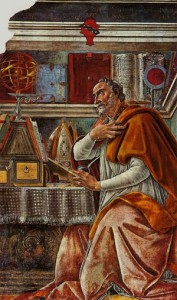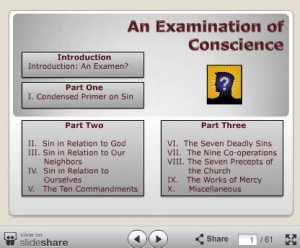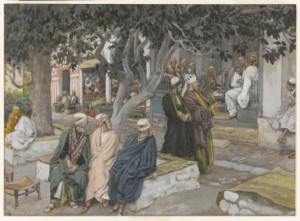The importance of his life and contribution to the Church cannot be overstated. St. Augustine, one of the greatest of the Church Fathers, has not only influenced the Church, but the thought of the world as we know it. The story of his conversion as chronicled in his “Confessions”, would be  enough, but then add the body of his theological work and you have nothing less than a glimpse of what is truly the power of “grace and mercy”.
enough, but then add the body of his theological work and you have nothing less than a glimpse of what is truly the power of “grace and mercy”.
Mike Aquilina is one of the best at bringing this great saint’s life into perspective.
For a more detail accounting of St. Augustine’s  life, you can visit Lives of the Saints
Spiritual Writings:
-Â ConfessionsÂ
-Â Letters
-Â City of God
-Â Christian Doctrine
-Â On the Holy Trinity
-Â The Enchiridion
-Â On the Catechising of the Uninstructed
-Â On Faith and the Creed
-Â Concerning Faith of Things Not Seen
-Â On the Profit of Believing
-Â On the Creed: A Sermon to Catechumens
-Â On Continence
-Â On the Good of Marriage
-Â On Holy Virginity
-Â On the Good of Widowhood
-Â On Lying
-Â To Consentius: Against Lying
-Â On the Work of Monks
-Â On Patience
-Â On Care to be Had For the Dead
-Â On the Morals of the Catholic Church
-Â On the Morals of the Manichaeans
-Â On Two Souls, Against the Manichaeans
-Â Acts or Disputation Against Fortunatus the Manichaean
-Â Against the Epistle of Manichaeus Called Fundamental
-Â Reply to Faustus the Manichaean
-Â Concerning the Nature of Good, Against the Manichaeans
-Â On Baptism, Against the Donatists
-Â Answer to Letters of Petilian, Bishop of Cirta
-Â Merits and Remission of Sin, and Infant Baptism
-Â On the Spirit and the Letter
-Â On Nature and Grace
-Â On Man’s Perfection in Righteousness
-Â On the Proceedings of Pelagius
-Â On the Grace of Christ, and on Original Sin
-Â On Marriage and Concupiscence
-Â On the Soul and its Origin
-Â Against Two Letters of the Pelagians
-Â On Grace and Free Will
-Â On Rebuke and Grace
-Â The Predestination of the Saints/Gift of Perseverance
-Â Our Lord’s Sermon on the Mount
-Â The Harmony of the Gospels
-Â Sermons on Selected Lessons of the New Testament
-Â Tractates on the Gospel of John
-Â Homilies on the First Epistle of John
-Â Soliloquies
-Â The Enarrations, or Expositions, on the Psalms
For me, out of all the St. Augustine’s work, this is the piece that deeply touches my heart and is one of my all-time favorite prayers:
Late Have I Loved You
A Prayer of Saint Augustine
Late have I loved you, O Beauty, so ancient and so new, late have I loved you!
And behold, you were within me and I was outside, and there I sought for you, and in my deformity I rushed headlong into the well-formed things that you have made.
You were with me, and I was not with you. Those outer beauties held me far from you, yet if they had not been in you, they would not have existed at all.
You called, and cried out to me and broke open my deafness; you shone forth upon me and you scattered my blindness.
You breathed fragrance, and I drew in my breath and I now pant for you.
I tasted, and I hunger and thirst; you touched me, and I burned for your peace.
This prayer is from his book, “Confessions.”
                         Â
Tags: confessions, conversion, fathers mike, grace and mercy, mike aquilina, our sunday visitor, prayer, st augustine
This entry was posted on Tuesday, August 28th, 2012 at 12:22 am
You can follow any responses to this entry through the RSS 2.0 feed.
 Baltimore Catechism to the Catholic Catechism, from the Ten Commandments to the 7 Deadly Sins, through in Archbishop Fulton Sheen and you have the help that can get through Lent and beyond…but first and foremost, start with PRAYER…come back now and then to check out different sections . Now let’s dive into the great well of grace and mercy found in the Sacrament of Reconciliation!
Baltimore Catechism to the Catholic Catechism, from the Ten Commandments to the 7 Deadly Sins, through in Archbishop Fulton Sheen and you have the help that can get through Lent and beyond…but first and foremost, start with PRAYER…come back now and then to check out different sections . Now let’s dive into the great well of grace and mercy found in the Sacrament of Reconciliation!Tags: 7 deadly sins, archbishop fulton sheen, baltimore catechism, catholic, Catholic Catechism, catholic podcast, catholic prayer, cathollc spirituality, examination of conscience, grace and mercy, OK, prayer, sacrament of reconciliation, ten commandments
This entry was posted on Wednesday, March 9th, 2011 at 12:55 am
You can follow any responses to this entry through the RSS 2.0 feed.
The First Saturday in Ordinary Time – from the Gospel of Mark the full reading and reflection
“Many tax collectors and sinners were sitting with Jesus”
an excerpt from today’s reflection by Don Schwager: 
When the Pharisees challenged his unorthodox behavior in eating with public sinners, Jesus’ defence was quite simple. A doctor doesn’t need to visit healthy people; instead he goes to those who are sick. Jesus likewise sought out those in the greatest need. A true physician seeks healing of the whole person – body, mind, and spirit. Jesus came as the divine physician and good shepherd to care for his people and to restore them to wholeness of life.The orthodox were so preoccupied with their own practice of  religion that they neglected to help the very people who needed care. Their religion was selfish because they didn’t want to have anything to do with people not like themselves. Jesus stated his mission in unequivocal terms: I came not to call the righteous, but to call sinners. Ironically the orthodox were as needy as those they despised. All have sinned and fall short of the glory of God (Romans 3:23). The Lord fills us with his grace and mercy. And he wants us, in turn, to seek the good of our neighbors, including the unlikeable and the trouble-maker by showing them the same kindness and mercy which we have received. Do you thank the Lord for the great kindness and mercy he has shown to you?
religion that they neglected to help the very people who needed care. Their religion was selfish because they didn’t want to have anything to do with people not like themselves. Jesus stated his mission in unequivocal terms: I came not to call the righteous, but to call sinners. Ironically the orthodox were as needy as those they despised. All have sinned and fall short of the glory of God (Romans 3:23). The Lord fills us with his grace and mercy. And he wants us, in turn, to seek the good of our neighbors, including the unlikeable and the trouble-maker by showing them the same kindness and mercy which we have received. Do you thank the Lord for the great kindness and mercy he has shown to you?
“Lord Jesus, our Savior, let us now come to you: Our hearts are cold; Lord, warm them with your selfless love. Our hearts are sinful; cleanse them with your precious blood. Our hearts are weak; strengthen them with your joyous Spirit. Our hearts are empty; fill them with your divine presence. Lord Jesus, our hearts are yours; possess them always and only for yourself.” (Prayer of Augustine, 4th century)
for the full reflection visit : Daily Reading and Meditation
Tags: catholic, catholic podcast, catholic prayer, cathollc spirituality, don schwager, gospel of mark, grace and mercy, pharisees, public sinners
This entry was posted on Saturday, January 15th, 2011 at 8:48 pm
You can follow any responses to this entry through the RSS 2.0 feed.

